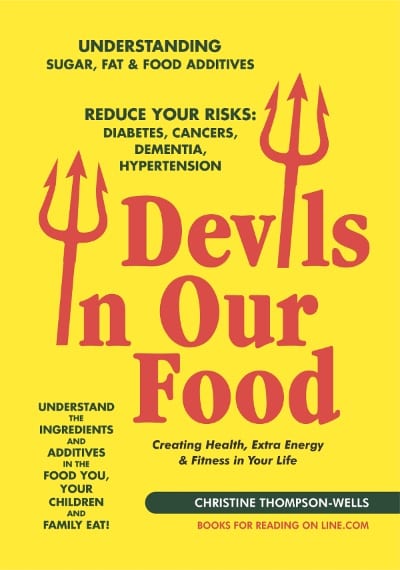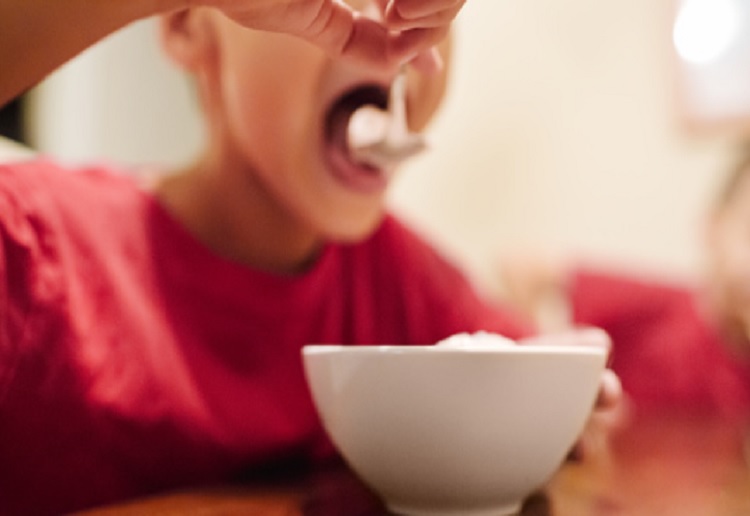Have you ever noticed a dramatic shift in your child’s behaviour after they consume processed food? Hidden, poisonous food additives are often to blame.
As of 2002, food manufacturers do not have to declare food additives on the information panel of a food product if the quantity is below 5%1. Meaning, if an additive is 4.99%, consumers will not know that they could be consuming potentially poisonous ingredients.
Food additives are used to make products look fresher, last longer and taste sweeter, but this comes at the expense of our health.
Additives are particularly harmful for children, causing significant behavioural issues and interfere with growth and development.
Educator, Christine Thompson-Wells is raising awareness of the hidden poison within manufactured foods through her recently launched book ‘Devils In Our Food’. Throughout her book Christine highlights the ways in which everyday food products can impact the behaviour of children.
Sugar Rush
For example, when children consume highly processed, sugary-based foods it creates a hormone rush. This hormone rush allows the hormone dopamine to be released, which interferes with the working of the synapse and neurotransmitters in a child’s brain. Dopamine is a demand hormone, meaning the more the brain has, the more the brain wants.
As a sugar rush hits the child’s system, the demand for sweeter foods can become more intense, making the child unsettled and tempered.
Extreme behaviour patterns not normally seen in your child may also become evident, such as ADHD or ADD. This is because the child’s body and brain are in a state of stress as a result of being fed poisonous food additives. Later, when the sugar rush begins to wear off, a child’s behaviour may change again as they start to become irritable, unhappy and naughty.
“It is important to understand the link between poor behaviour and the food we give our children. Popular everyday food products are full of hidden additives that can cause significant health problems such as headaches, skin irritation, neurological disorders, birth defects, behavioural problems and some cancers,” author Christine warned.
How To Swap Out Harmful Food Additives
Christine shares four common children’s food products and healthier alternatives they should be swapped with:
1. Swap breakfast cereals for organic oats
Aspartame, Nutrasweet and Equal (951) are flavour enhancing additives that are often found in popular breakfast cereals. Aspartame is linked to many health problems including dizziness, speech problems and neurological disorders. Organic oats with fresh fruit topped with blueberries and honey is a great alternative that won’t leave children bouncing off the walls.
2. Swap soft drinks for freshly squeezed juice
Dimethyl Dicarbonate (242) is a dangerous yeast inhibitor which can be found in carbonated and noncarbonated drinks such as children’s soft drinks. If inhaled it can cause breathing difficulties and irritation to the nose, throat and respiratory tract. Freshly squeezed juice is a much healthier alternative and provides some fun for kids in the kitchen.
3. Swap pre-made baby foods for mashed organic vegetables
Starch Acetate (1420) is an additive that can be used in baby foods. It is linked to high cholesterol, pathological changes in the lungs and stomach disorders. Mashed organic vegetables are high in vitamins and minerals to strengthen your child’s immune system, without the added sugar and preservatives.
4. Swap sugary spreads for honey as a natural sweetener
Acesulphame potassium (950) is often found in popular food spreads and is at least 200 times sweeter than sugar. Its is used in food to stimulate the pleasure centre of the brain, which creates problematic behaviours in children. Parents should opt for honey as a natural source of sweetness.
Devils In The Food
Devils In Our Food reader Katrina Kirk says, “This book has been a massive game changer to our family. Having family members who suffer from ADHD and food intolerance to certain additives, this book has opened my world to understand the reasoning behind why they respond to such additives with knowing the makeup of each. The book has now allowed me to work with them and to educate them on the reasoning behind their ups and downs and mood swings.”

Do you find that food additives affect your child’s behaviour? Tell us in the comments below.




















10:37 am
1:29 pm
11:20 am
1:39 pm
3:05 pm
11:24 pm
2:28 pm
5:03 pm
11:25 pm
9:09 pm
1:47 pm
1:33 pm
10:25 pm
-

-
-
Ellen replied
- 05 Mar 2020 , 4:47 am

Reply7:29 pm
3:30 pm
12:36 pm
7:28 am
5:01 am
10:55 pm
9:33 pm
- 1
- 2
- »
Post a commentTo post a review/comment please join us or login so we can allocate your points.